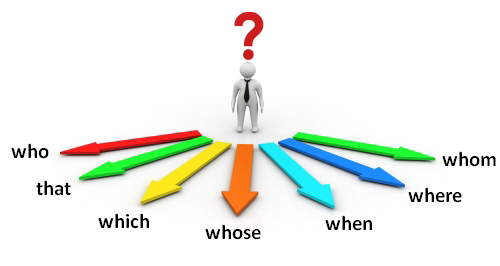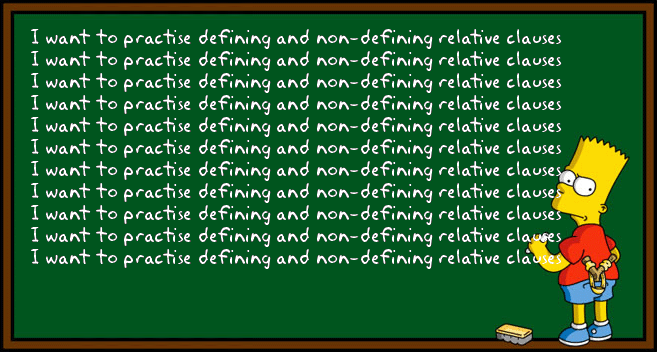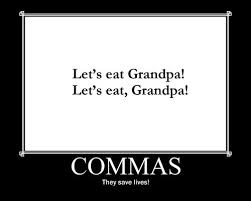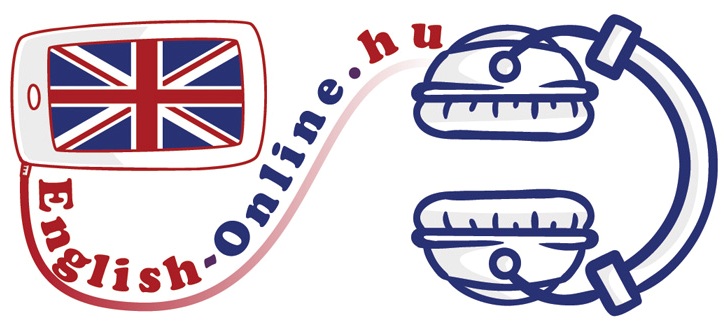DEFINING AND NON-DEFINING
RELATIVE CLAUSES
A vonatkozói mellékmondatok (RELATIVE CLAUSES) olyan két tagmondatból álló összetett mondatok, melyeket vonatkozó névmás (RELATIVE PRONOUN) köt össze és két fajtájuk ismert. Na tessék! Az előző mondat pont megfelel az egyik fajtának, melynek neve: DEFINIÁLÓ (DEFINING). A másik az egyszerűség kedvéért a NON-DEFINING (NEM DEFINIÁLÓ), azaz BŐVÍTŐ névre hallgat. Hogy miért? Máris megtudod! A két típus mindegyikében van főmondat (MAIN CLAUSE) és mellékmondat (RELATIVE CLAUSE), viszont nagyon eltérő kommunikációs céljaik és használati szabályaik vannak, amelyeket az alábbi példákon keresztül könnyebben elsajátíthatod. Sok sikert!
Először is, a
VONATKOZÓ NÉVMÁSOK:
WHO=aki, akik, akit, akiket stb.
WHOSE=akinek a...., aminek a.....
WHICH=amely, ami
WHERE=ahol
THAT=aki, akik, akit, akiket, amely, amelyet, amelyek, amelyeket, ami, amit, amik, amiket stb.
WHAT=the thing which, the things which=a dolog, ami...; a dolgot, amit...; a dolgok, amik...; a dolgokat...amiket

És akkor jöjjenek a mondatfajták:
DEFINING
-definiálod a dolgot, személyt, helyet
-pontosítod, hogy ki kicsoda, mi micsoda, és mi hol történik/történt
-nincs vessző ezekben az angol mondatokban
-minden része létfontosságú, nincs törölhető mellékmondata
-csak ezekben helyettesíthető a WHO és a WHICH, a következővel: THAT
-törölheted a WHO/WHICH/THAT vonatkozó névmást, de csak akkor, ha a főmondat és a mellékmondat alanya KÜLÖNBÖZŐ
Néhány példa:
Ő az a pasi, aki veri a feleségét.
He is the man WHO/THAT abuses his wife.
Ez az a lány akinek a kutyája megharapott a minap.
This is the girl WHOSE dog bit me the other day.
Az az a ház, aminek az ablakai a tengerre néznek.
That's the house WHOSE windows overlook the sea.
Ez egy olyan tárgy, amit fogmosásra használunk/használsz.
This is an object WHICH/THAT/- we/you use to clean your our/your teeth.
Ez az a templom, ahol összeházasodtunk.
This is the church WHERE we got married.
Törölhető a WHO/WHICH/THAT vonatkozó névmás ezekben a DEFINING mondatokban (mert a főmondat és mellékmondat alanya különbözik illetve a vonatkozó névmás tárgy esetben van):
Én vagyok az a nő, akire vártál.
I am the woman (WHO/THAT) you have been waiting for.
Ez az a repülő, amelybe az anyukám beszállt.
This is the plane (WHICH/THAT) my mother boarded.
Ez az a ruha, amit tegnap is viselt.
This is the dress (WHICH/THAT) she wore yesterday too.
Különös figyelmet kíván a:
WHAT= the thing(s) which!
Csak olyan mondatokba teheted a WHAT-ot, amelyben azt helyettesíthetnéd a the thing(s) which-csel, azaz amely fordításába bele tudod "nyomorítani" azt a frázist, hogy: a dolog, ami/a dolgot, amit/a dolgok, amik/a dolgokat, amiket
Nem hiszem, amit mondasz.
Nem hiszem (A DOLGOT), amit mondasz.
I can't believe WHAT you are saying.
Nem hallom, miről beszélgetnek.
Nem hallom (A DOLGOT), amiről beszélgetnek.
I can't hear WHAT they are talking about.
Nem tudom elolvasni, ami ide van írva.
Nem tudom elolvasni (A DOLGOT), ami ide van írva.
I can't read WHAT is written down here.
Érted, amiről énekel?
Érted (A DOLGOT), amiről énekel?
Do you understand WHAT he is singing about?
Nem érdekel, mi történt.
Nem érdekel (A DOLOG), ami történt.
I don't care WHAT happened.
Megtudhatnám, mi folyik itt?
Megtudhatnám azt (A DOLGOT), ami itt folyik?
Could you tell me WHAT is going on here?
Mint látod, a "DOLOG" sosincs megnevezve ezekben a mondatokban.
Ha meg volna, akkor már which/that lenne a névmás!
Ez egy olyan dolog, amit arra használsz, hogy felhívd az anyádat.
This is a thing WHICH you use to call your mother.
Ez egy gép, amely ruhát mos.
This is a machine WHICH washes clothes.
Ez egy olyan tárgy, amivel megvághatod magad.
This is an object (WHICH/THAT/-) you can cut yourself with.
Ezek a cipők, amiket általában hord.
These are the shoes (WHICH/THAT/-) she usually wears.

NON-DEFINING
-nem definiáló, hanem "bővítő", "traktáló", "magyarázó"
-lényegtelen, nem létfontosságú frázissal/mellékmondattal bővíted az amúgy is értelmes kerek mondatot
-a "lényegtelen", extra info-t két vessző közé, vagy vessző és a mondatvégi pont közé ékeled be
-NEM HELYETTESÍTHETI a THAT egyik vonatkozó névmást sem
-NEM TÖRÖLHETŐ a beékelt bővítő félmondat vonatkozó névmása
Néhány példa:
London-- melynek metróját "tubusnak" hívják-- az egyik legdrágább európai város.
London, WHOSE underground is called the "tube", is one of the most expensive cities in Europe.
Az apai nagymamám-- aki épp most töltötte be a 85-öt-- még mindig imádja a rock zenét.
My grandmother on my father's side, WHO has just turned 85, still loves rock music.
Brad Pitt, aki valójában Angelina Jolie férje, Mrs. Smith férjének szerepét játszotta a Mr. és Mrs. Smith című filmben.
Brad Pitt, WHO is Angelina Jolie's husband, played the role of Mrs. Smith's husband in the movie 'Mr. and Mrs. Smith'.
Egy speciális eset:
Ha egy egész frázisról/félmondatról mondod el a véleményed, használj WHICH-et.
Mindig otthagyja a teli hamutálat az étkezőasztal közepén, ami (tehát ez az egész cselekvés) borzasztóan idegesít.
He always leaves the full ashtray in the middle of the dining table, WHICH really annoys me.

|




 nyelvoktató csatornámra!
nyelvoktató csatornámra!



